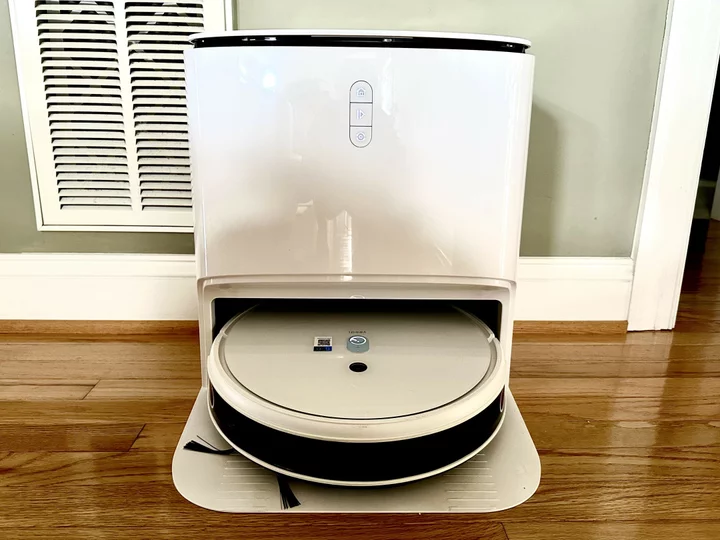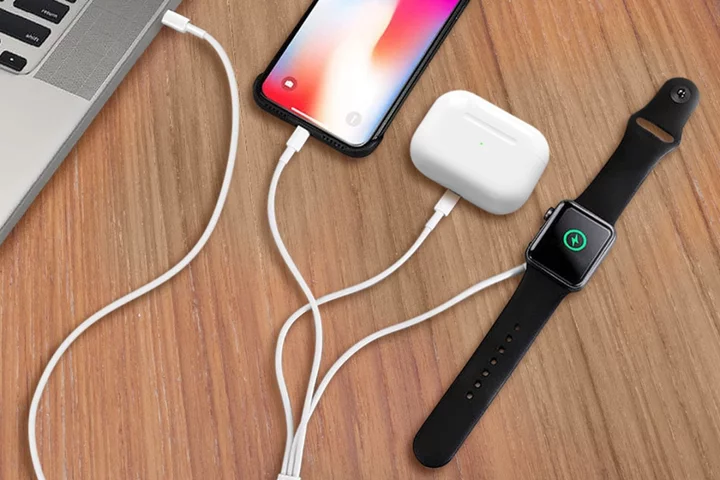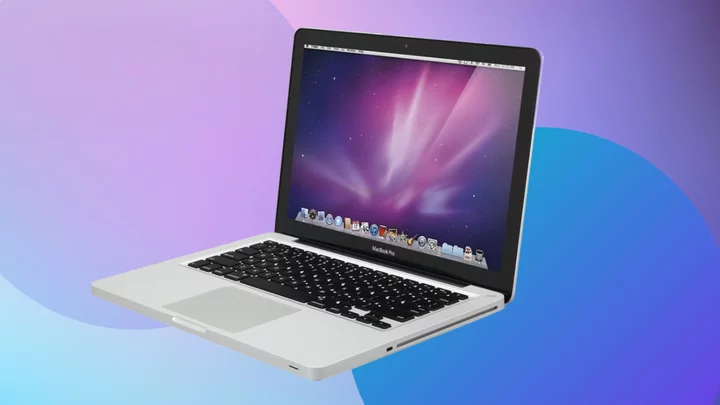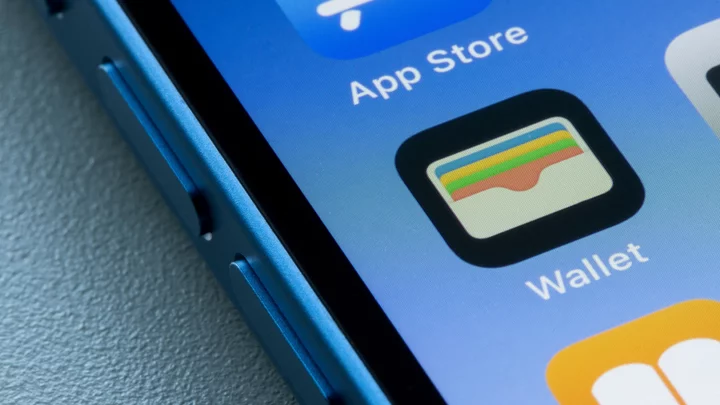As someone who is staying at her parents' house in the 'burbs this summer, I was thrilled to try out the Yeedi Mop Station Pro's 2-in-1 vac/mop capabilities on the 1,300 square feet of our first floor. When the massive package arrived on my doorstep and I set up the vacuum, along with its docking station, I had high hopes based on just how futuristic and promising it looked. Daydreams of glistening hardwood floors and perfect vacuum lines on fluffy carpets started floating through my head. I wanted Yeedi (which I nicknamed Lil Yeedi as an ode to my favorite rappers) to succeed, I really did.
What followed during rigorous testing was eye-opening — and proved that multifunctional robot vacuums can't do it all, much like busy people spread too thin.
Via Giphy(opens in a new tab)User friendliness and ease of setup
My dad was the first one to get his hands on Lil Yeedi and proceeded to download the Yeedi phone application for Android from a QR code plastered on the vac itself. He reported that the process repeatedly malfunctioned: The app glitched, featured Chinese characters, and couldn't connect to the home WiFi properly. When I similarly scanned the QR code and got the Yeedi app for iPhone, everything worked flawlessly. WiFi connection was a breeze, the map my dad had made of our first floor space was already pre-loaded, and I could get to powering up the vac pronto.
This makes me think that, as far as user friendliness of the Yeedi app is concerned, you're safer off being a Yeedi and Apple user.
SEE ALSO: The Roomba Combo j7+ is pretty good at cleaning and really good at not eating phone chargersNow, I did mention mapping earlier — which is an essential part of any robot vacuum's capabilities. The Yeedi Mop Station Pro is a vSLAM robot, which essentially means it maps and navigates around your humble abode using upward-facing cameras versus Lidar lasers. Generally speaking, vacs equipped with vSLAM are cheaper than their Lidar counterparts but also do a worse job in dark areas and are way less accurate in terms of adhering to virtual boundaries. When my dad programmed Lil Yeedi, he said it took the vacuum more than a day to run its course multiple times around the rooms and get a visual of their full layout. In other words, the vac started this procedure around 4 p.m., got tired, docked, and only finished the job at hand by midday the next day.
Setting up the Yeedi's WiFi is easy (at least on an iPhone). Credit: Stacia Datskovska / Mashable What you'll see every time you open the Yeedi app. Credit: Stacia Datskovska / MashableGetting stuck and randomly running out of battery
Full disclosure: The first floor of my house, where I tested out the Yeedi Mop Station, has a pretty unconventional layout and is also freaking big — with many corners, wall edges, low shelves, and changes in flooring that would instill trepidation in the heart of even the mightiest robot vacuum. For that reason, I gave my Yeedi the benefit of the doubt: In more conventionally designed and smaller rooms, it likely wouldn't have faced the problems it did when I tested it.
These problems included getting stuck under the aforementioned low shelves and coffee tables and between the legs of a chair (the vac is pretty bulky and about 7.5 centimeters in height); completely missing dust along the edges of walls or in certain nooks and crannies; and taking many painful attempts to get on top of a floor rug in my living room.
As far as battery life goes, the Yeedi Mop Station worked variably well in that department. During my biggest cleaning (1,000 square feet cleaned), Lil Yeedi ran around the house for 144 cumulative minutes on a full charge before dutifully returning to its charging station. BTW, the app notifies you of this and the Yeedi itself utters an exclamation that it's returning to the dock in a friendly, Siri-adjacent voice. After this cleaning, however, the Mop Station started running out of juice after only 50 minutes or so, and often even less. This was supremely frustrating, as it sometimes didn't return back to areas it missed (even when I enabled the "Resumed Clean" function, which guarantees the robot will continue with unfinished cleaning tasks after charging). This means I had to reprogram it myself. A hassle and a half.
Here's what the Yeedi app allows you to adjust and control when it comes to the Mop Station Pro. Credit: Stacia Datskovska / Mashable Photo CompositeYeedi's biggest enemy? Large crumbs.
My favorite part of testing Lil Yeedi was crushing up old graham crackers that weren't usable for s'mores anymore and sprinkling the crumbs over various floor surfaces.
I first did it on my linoleum kitchen floors to check out Yeedi Mop Station's "Custom" cleaning capacity (as opposed to "Auto," which runs through the whole map on its own time). With custom cleaning, you can select a square or rectangle of any dimension on the map and send your vac there instantly. When I did that — routing Lil Yeedi to my sugar-scented mess — it gave an underwhelming performance. The vacuum moved in a maze-like pattern until the programmed area was all "clean." Clean in quotation marks because the vac's side brush simply scattered the larger crumbs outward and didn't go back to remedy this mistake. I was left with some prominent crumbs on the floor while Lil Yeedi satisfactorily went back to its resting spot (note: The vacuum did eat up almost all of the smaller crumbs).
My next tests were another graham cracker mess underneath a chair that I envisioned would be a problem for the Yeedi to get under (it was), one on hardwood floors relatively close to a corner, a crumb pile on carpeting in the dining room, a trail of crumbs along the edge of the hardwood floors leading up to the bathroom, and two mini-piles on a low bathroom mat/bathroom tile.
I set the Yeedi on "Auto" with "Standard" suction power and went to chill by the pool. Why was I... kind of nervous on behalf of Lil Yeedi? I truly wanted to come back upstairs to fully crumb-free rooms. No graham crackers in sight.
And what happened?
The Mop Station completely ignored the crumbs under the chair (I figured), left approximately one-third of the crumbs on all the hardwood floors (including the ones I scattered in a trail along a wall edge), disregarded a minor proportion of the two crumb piles in the bathroom, and actually did a beautiful job on the dining room carpeting. My verdict is that the long side brush is Yeedi's Achilles' heel. On bare floors especially, the brush pushes finer particles away from the vacuum's trajectory instead of pulling them closer into the suction mechanism.
It's thus best for carpet vacuuming and leaves those immensely satisfying vacuum lines every homeowner dreams of.
The crumbs that were left over after Lil Yeedi attempted to vacuum them up. Credit: Stacia Datskovska / Mashable Photo CompositeGorgeous, gorgeous mopping
Since the Yeedi Mop Station Pro prizes itself on dual-power spin mopping (what with its two mopping attachments and separate mop bin), I was really eager to put this feature to the test.
Alternating between vacuuming and mopping functions is really easy with the Mop Station: You simply have to switch out the original dust bin for a mopping-specific one found in your kit, attach to its bottom two mopping pads (that have 10N of force and do 180 rotations per minute), click the new bin into place, fill Yeedi's clean water tank with some tap (I added Pine-Sol as a fragrant bonus), and click the little logo of six water droplets arranged in a circle on the bottom right of the main app navigation screen. From there, you can mop on "Area," "Auto," or "Custom" settings like with vacuuming ("Area" just means you can choose the order of rooms cleaned).
The Yeedi proceeded to go at my kitchen linoleum — almost silently and quite effectively. I spilled some milk, thicker kefir, and soy sauce in three distinct places on the floor (oopsie) to see how well Lil Yeedi would mop. It area-cleaned for 56 minutes (398 square feet), only going back to the dock once to apparently clean out its mopping pads. According to the product description, Yeedi also thoroughly dries the pads after every cleaning to eliminate foul odors.
I came back to my kitchen expecting Graham Cracker Experiment Pt. 2 (AKA all the spills still left out on the floor). None of that happened: The kitchen linoleum glistened, smelled refreshingly of Pine-Sol, and was free of any and all spills/stains (even the ones I didn't intentionally make).
In other words, I found that the Yeedi Mop Station Pro is amazing at mopping and not so great at vacuuming on a finer scale. However, I didn't experiment with what would happen when the Yeedi mopped in a room that included carpeting or rugs. In mopping mode, it apparently steers away from carpets to avoid wetting them. Given the fact that Yeedi already has a challenging time tackling thick carpets when it's on vac mode, this checks out.
My dog Umka being a loyal spectator of Lil Yeedi's rounds. Credit: Stacia Datskovska / Mashable My kitchen post-mopping — pure eye candy. Credit: Stacia Datskovska / MashableDownsides: No self-emptying and limited working hours
Besides failing the Graham Cracker Experiment (Pt. 1), having wonky battery life, and frequently calling out for help when it's stuck under a low table, the Yeedi Mop Station Pro's biggest downside is also its lack of self-emptying. This is a lifesaver in many comparable vacs like the Roborock S7, which has a dust bag that allows you to neglect emptying the vacuum for months at a time.
The Mop Station Pro's dust bin, on the other hand, filled up pretty quickly with tangles of hair, lots of gray dust, and bits and pieces of those graham crackers you're already tired of hearing about. Inside the bin, its filter was coated with a thick layer of dust, which I removed with a special brush that comes included in the package. This whole routine didn't take long at all, but, as someone who has allergies to dust mites, I'd rather avoid it completely. Interestingly, the Yeedi Vac Station (sans mopping) does auto-empty. It's a tradeoff, as many things in life are.
The last aspect of Lil Yeedi's work that bumped down its performance rating in my eyes is the fact that, because of its vSLAM versus Lidar mapping/navigation system, it can't work at night (the cameras cannot detect objects or perimeters in low lighting). With laser robot vacuums my family used before, we were able to program them ahead of time, go to bed, and wake up to a squeaky clean house. Ultimately, that's the whole hope with futuristic-looking robot vacuums, isn't it? To save time and effort and let a machine treat you for once.
Is the Yeedi Mop Station Pro worth it?
OK, I love a sexy-looking robot vacuum that offers vacuuming and mopping as much as the next girl does. In theory. When it comes to the Yeedi Mop Station Pro, it did some things well (mainly, mopping my kitchen), but it would be hard to say it "ate and left no crumbs" in terms of anything else. Literally, Lil Yeedi did leave crumbs... and lots of them.
If you're in the market for a vacuum that you'll power up during the day when on another floor or in another room of your house — to do an overall light floor clean rather than eliminating a big mess — and you don't mind nudging it every now and then when it's trapped, get this Yeedi model.
According to the price tracking software Honey, the Yeedi Mop Station Pro fluctuates from retailing for $799.99 to a substantially lower $499.99 pretty sporadically. This means Prime Day 2023 is the perfect chance to apply a $300 on-page Amazon coupon and bring your own Lil Yeedi home, maybe introduce it to your parents.
However, if I'm being frank, the Yeedi Mop Station Pro's description oversells its reality. Its mopping is stellar, yes, but you could also get a robot mop (like the iRobot Braava jet m6, for instance) that exclusively mops versus promising to do everything under the sun and then coming short.
Regardless, you can catch me continuing to program Lil Yeedi twice a week to keep the hardwood, linoleum, and carpets in my parents' home in check. And definitely continuing to use this baby as a mop. With its included second set of replaceable mop pads, I envision this will be a lasting — if imperfect — relationship.









